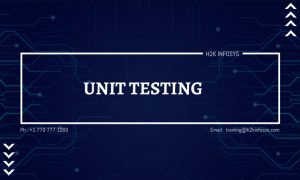The field of software testing is one of the most dynamic and rewarding career paths in the tech industry. Whether you’re a fresher just starting or an experienced professional seeking to upskill, mastering software testing concepts is essential for landing a quality assurance (QA) job. In this blog, we will explore key software testing interview questions and answers that will help you prepare for interviews, highlighting real-world examples and detailed explanations.
This comprehensive guide will benefit individuals pursuing Quality assurance tester training, offering practical insights into how the knowledge gained during training applies to industry-standard interview questions.
Introduction
The demand for QA testers is rising, and software testing plays a crucial role in the software development life cycle (SDLC). Organizations worldwide rely on robust testing to ensure product quality, which has made QA tester training an essential part of skill development for IT professionals. This blog will address the common and advanced questions faced by both freshers and experienced testers in job interviews.
Whether you are a novice entering the software testing field or an experienced tester, understanding these questions will give you a competitive edge.
Basic Software Testing Interview Questions for Freshers
What is Software Testing?
Answer: Software testing is the process of evaluating and verifying that a software application or system meets the specified requirements and functions as expected. The main goal of testing is to identify defects, improve quality, and ensure that the product is free from bugs before release.
Example: In a banking application, testing ensures that financial transactions (like deposits and withdrawals) are processed correctly and securely.
Explain the Difference Between Verification and Validation.
Answer:
- Verification ensures that the product is designed and implemented correctly according to the requirements. It’s a quality control process focused on development artifacts (e.g., documents, code).
- Validation ensures that the product meets the end-user’s needs and fulfills its intended purpose. It’s a quality assurance process focused on the actual product in use.
Real-World Scenario: During software testing, verification might involve code reviews and static analysis, while validation involves running the application and checking if it meets customer expectations.
Advanced Software Testing Interview Questions for Experienced
What is Regression Testing, and When is it Required?
Answer: Regression testing is the process of re-running previously executed tests to ensure that recent code changes haven’t negatively affected existing functionality. It’s critical after updates, bug fixes, or new feature additions.
Example: Imagine an e-commerce site that introduces a new payment gateway. Regression testing will ensure that other existing gateways and functionalities, such as cart management and user authentication, still work as expected.
Explain Test Automation Frameworks.
Answer: Test Automation frameworks are structured guidelines used to create and execute automated test scripts efficiently. Common frameworks include:
- Data-Driven Framework: Uses data stored in external files like Excel, making it easy to test different input values.
- Keyword-Driven Framework: Keywords represent specific actions, and the framework executes them based on pre-defined rules.
- Hybrid Framework: Combines the benefits of data-driven and keyword-driven frameworks.
Example: A popular tool like Selenium can be used with a hybrid framework to automate web application tests, improving test coverage and reducing manual effort.
Scenario-Based Questions
How Do You Approach a New Testing Project?
Answer: When starting a new project, it’s essential to:
Understand the Requirements: Review project documentation and functional requirements.
Test Planning: Define scope, resources, and schedule. Establish which types of testing (functional, regression, performance) will be conducted.
Test Case Design: Write detailed test cases based on the requirements.
Test Execution: Perform tests, log defects, and retest after fixes.
Reporting: Summarize findings and provide actionable feedback.
Example: In a healthcare management system, understanding patient data workflows and compliance with industry standards like HIPAA is crucial during test planning.
What Would You Do if You Find a Critical Bug at the End of the Sprint?
Answer: If a critical bug is discovered at the end of a sprint:
Communicate: Immediately notify the development team and stakeholders about the severity of the issue.
Prioritize Fixing: The team should prioritize fixing the bug before proceeding with other tasks.
Evaluate Options: If fixing the bug impacts the sprint deadline, either the release is postponed or a temporary workaround is implemented.
Retest: After the fix, retest the entire affected module to ensure the bug is resolved without introducing new issues.
Example: Suppose a major security flaw is found in a mobile banking app. It’s critical to resolve it before the app is pushed to production, even if it delays the release.
Industry Statistics and Case Studies
Industry Statistics
- According to a recent report by Capgemini, 89% of IT companies highlight the importance of quality assurance and testing in their development process.
- The global software testing market is expected to reach $60 billion by 2026, driven by the need for robust security and functionality testing.
Case Study: Real-World Application
A major retail company integrated a new feature in their e-commerce platform for tracking orders. During testing, they found that the new feature caused system crashes during peak hours. A combination of manual and automated testing uncovered performance bottlenecks. After resolving these issues, they launched the feature, which handled 500,000 orders per day seamlessly.
Conclusion
Mastering software testing concepts is essential for career success in quality assurance. Whether you are a fresher or experienced professional, thorough preparation for software testing interviews will give you an advantage in securing your desired role. With proper QA tester training, you will gain the skills needed to excel in testing interviews, handle real-world projects, and troubleshoot critical software issues.
Key Takeaways
- Quality assurance tester training equips you with practical skills for manual and automated testing.
- Real-world examples, such as regression testing and test automation frameworks, highlight the importance of understanding both basic and advanced concepts.
- Case studies emphasize the critical role of QA testers in ensuring software stability and functionality before release.
- Industry trends indicate continued growth in the software testing sector, with significant opportunities for trained professionals.
Call to Action: Enroll in H2K’s Quality Assurance Tester Training
Do you want to excel in your software testing career? H2K Infosys offers comprehensive QA tester training programs that cover everything from basic testing concepts to advanced tools and techniques like Selenium and JIRA. With hands-on projects, real-world case studies, and expert instructors, our courses are designed to help you become a certified QA tester.
Start your journey today! Enroll in our quality assurance tester training and boost your chances of landing a high-paying job in the tech industry.























